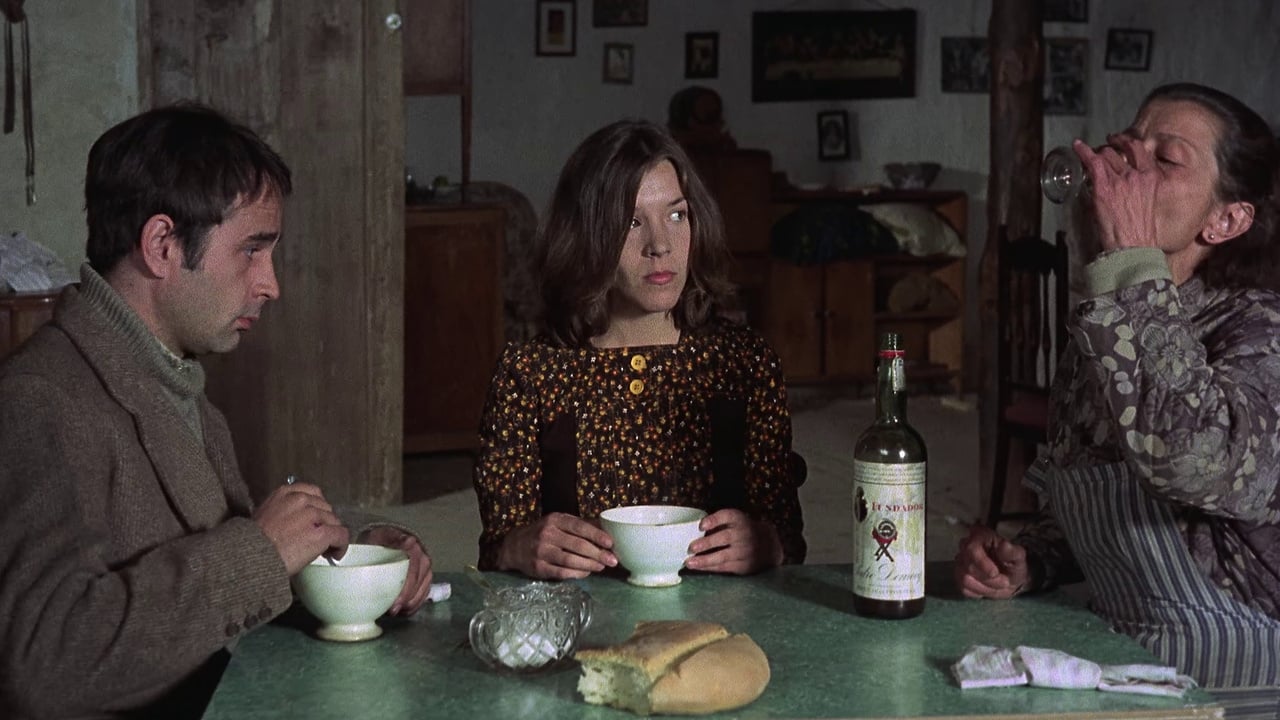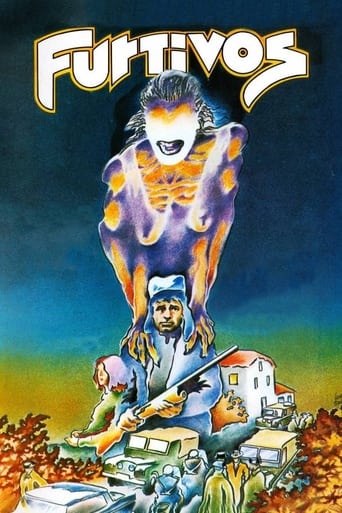



Truly Dreadful Film
Admirable film.
One of the best movies of the year! Incredible from the beginning to the end.
View MoreJust intense enough to provide a much-needed diversion, just lightweight enough to make you forget about it soon after it’s over. It’s not exactly “good,” per se, but it does what it sets out to do in terms of putting us on edge, which makes it … successful?
View MoreA shy hunter , an ¨Alimañero¨, Angel (Ovidi Montllor) , lives in a small inn or Meson in middle of woods in Valley of Cabuerniga (Cantabria) and dominated by his incestuous mommy , Martina (Lola Gaos) . Angel falls in love for a fierce , insolent girl called Milagros (Alicia Sánchez) who has escaped from an orphanage run by nuns of ¨Divino Consejo¨ . Shameless Milagros is the lover of a ¨Quinqui¨ or delinquent called ¨El Cuqui¨ (Felipe Solano) . Meanwhile , the Civil governor , Santiago (Jose Luis Borau) , goes to the Martina's Meson , sets out in hunting , shoots deers and he eats tasty stews . Spanish classic drama in Neo-realist style with excellent players and masterfully directed by Jose Luis Borau . This splendid drama develops a peculiar romance , a triangular love story , plenty of sadness and melancholy , between a trapper or ¨Alimañero¨ and a cheeky orphan . Throughout several narrative ellipsis , co-writer , producer , filmmaker Borau develops a strong retelling , including violence on animals , and being perfectly shot . The movie deals with various interesting issues such as ¨jealousy¨ that the old Martina has on young Milagros , including dramatic scenes as when the mother is put out her bed and room . Thought-provoking and thoughtful screenplay by Manuel Gutiérrez Aragon , subsequently a prestigious writer and director , concerning the rural world , an ordinary theme of his films . Fine performances from Ovidi Montllor as a lonely , timid man who falls in love with a scoundrel person well played by Alicia Sanchez . Lola Gaos , recent her great interpretation for ¨Tristana¨, steals the show , she gives an unforgettable and deep acting . The movie displays a nice Spanish secondary cast such as Erasmo Pascual , Jose Riesgo , Beni Deus , Antonio Gamero , Simon Arriaga and Ismael Merlo as a priest . Furthermore , Jose Luis Borau as Governor , he gives an awesome acting , adding an ironical and funny touch . This character of the Governor was offered to José Luis López Vázquez , but when he couldn't do it and with little time to start shooting, the director replaced at the last minute , as José Luis Borau casted himself , by insistence of co-writer Manuel Gutiérrez Aragón who had previously worked with Lopez Vazquez in ¨Habla Mudita¨. This is a 'rara avis' film of the 70s because dealing with a strong portrait of Spanish rural society , it didn't please the pro-Franco authorities and was strongly censored . Borau's conceptual and political audacity as well as the social criticism result to be so evident in this film who he had to fight the censorship which didn't admit the some engaging scenes and obligated to cut some violent and terrible frames . The flick has two habitual defects , ordinaries in Spanish cinema by that time : most actors are dubbed and an inappropriate musical score by the band Vainica Doble . The movie was rejected in Festival of Cannes and Venice ; however , winning the Golden Shell in Festival of San Sebastian in 1975 during a thunderous environment when took place the last death penalties and ordered by General Francisco Franco . Really censored , finally , it was exhibited with no cuts . Striking cinematography by Luis Cuadrado , including correct remastering and gorgeous outdoor sequences with leafy exteriors . Being shot on location in Montejo, Madrid, and Rebollo, Segovia, Castilla y León, Spain . This motion picture was stunningly directed by Jose Luis Borau . He managed to make a fluid , decent and enjoyable drama . Borau began as a Critic of cinema and to publish articles about cinema in newspapers . He enters the Spanish Official Cinema School where he later become a teacher and after that , he directed documentaries and films . He was President of the Spanish Academy of Motion Picture Arts and Sciences ; in addition , member of the jury at the Berlin International Film Festival in 1991 . Borau was one of the best Spanish filmmakers who alternated flops as ¨Rio Abajo¨, ¨Leo¨ , ¨El Monosabio¨, ¨Tata Mia¨, along with successes such as ¨La Sabina¨ , ¨Mi Querida Señorita¨ , ¨Hay Que Matar a B¨, and his greatest picture , this hit ¨Furtivos¨ that was one of the greatest successes of Spanish cinema .
View MoreThis visually outstanding film is with no doubt one of the very best made in Spain in the Seventies, and I personally place it among the top ten Spanish films of all time. It is a very subtle satire of the socio- political climate in the country during the last days of Franco and just as the dictator was agonising in a Madrid hospital. The first time I saw it, I couldn't believe just how daring the film is with scenes of sexual nature and as an open criticism of the corrupt authorities and their hypocrisy. It is unbelievable that it fooled Franco's censors at all. Angel is a young man who lives with his mother Martina in the heart of the forest, where they run a tavern. Besides that Angel also makes some occasional cash from poaching and selling the meat to the village shops. During one of his trips to the town he meets a girl, Milagros, who has escaped from a juvenile detention centre. He falls for her, and takes her home. At the same time, the police are looking all over the town for a famous petty delinquent whom, as we will learn later, is Milagros' boyfriend. The man leading the manhunt is the governor of the province, who, as we'll also learn in a moment, is Angel's stepbrother. When the young couple arrive home, Martina receives Milagros with great distaste and suspicion, and will try anything to humiliate her and force her to leave. When the governor and his entourage also arrive, looking forward having a free lunch and some game-shooting in the forest, Martina gives Milagros away. In order to avoid going to prison for the abduction of a minor, Angel is forced to marry the girl. After the wedding, Martina's feelings remain the same and we can see she is up to something. At the same time, the escaped delinquent has traced his fiancée down and comes to pick her up. She agrees to go with him that night –she married Angel only to avoid being sent back to the institution, she never loved him- , but Martina murders her before that can happen. Angel, after helping the fugitive avoid being captured by the police that are combing the forest, believes his mother when she tells him that Milagros ran away with her pimp because she was a slut in the first place. But later he finds some of her belongings still stashed in the bedroom, and knowing that she would never have left them behind, he works out the truth. The following morning he takes Martina to mass in the village and orders her to take confession with the priest. When she seems reluctant, he knows for sure she killed Milagros. He pushes her to take confession, and the priest's face when she comes out says it all to Angel. On their way back home he shoots her in the back and leaves her to die in the snow. At the house, all locked up and now totally alone, he goes through Milagros' scarce belongings just to remember her once more.Martina represents Franco's Spain: Catholic, conservative and narrow- minded. She never leaves her isolated environment, she is a staunch Catholic who nevertheless is capable of committing cold-blood murder and feels no remorse, publicly respects the figures of authority although inside can't stand the sight of them, she won't tolerate a "slut" under her roof, and she is a domineering mother who still treats her thirty- year-old son like a little boy who needs guidance. Angel represents the young Spain who wants to be free and democratic: he goes to town and mixes with other people, he has no prejudices about knowing a "slut" and helping her because he believes she is good, he defies authority by bringing her into the house, poaching behind his stepbrother's back and helping a convict escape under the police's noses. And in between these two worlds there stand the corrupt authorities: the governor calls at the tavern for lunch even though he knows the game he will be eating in a minute comes from poaching. He is a hypocrite who signs laws and warrants and then turns on a blind eye if he knows he will profiting from the crime that is being committed. An intense story with some moments of suspense, a fantastic setting in a natural environment that makes you feel you are in the middle of nowhere, a superb and very atmospheric cinematography, a great musical score and a truly excellent cast: character actor Ovidi Montllor as Angel, who shows here what a good leading actor he could be when given the chance; character actress Lola Gaos, who was often typecast in old bitch roles, as Martina; and the director of the film himself, Jose Luis Borau, as the capricious and rapacious governor.
View MoreThis film is so grim and haunting... It is one of the best representations of the Spanish golden age of cinema during the seventies. I can think of only a handful of films that achieved similar levels of craftsmanship and atmosphere: 'La Prima Angélica' (1974) and 'Cría Cuervos' (1976) by Saura are probably the finest examples.'Furtivos' is a poetic metaphor of the dark times Spain lived during the dictatorship without being too political. The mother and the son, living isolated in the forest, are themselves the representation of the relationship between people and government at the time.A must if you want to understand Spanish cinema and Spanish culture during those difficult times when Franco was dying (it was released two months before his death). It shows more than many other films without being too obvious, which is a relief if you don't like 'didactic' films.
View MoreJosé Luis Borau's experience as a director of spaghetti westerns shows in his skillful construction of hunting scenes, his choice of eerily beautiful soundtrack music, and his loving depiction of wooded Spanish landscapes outside of Madrid. Borau once told an interviewer that he wanted to make a film about the forest, and one of the most compelling aspects of the film is the cinematography. Overall, the story plays like a cross between Butch Cassidy and the Sundance Kid's idyllic story of criminals (Ángel the poacher and his girlfriend, Miraglos, a runaway from a boarding school) and Psycho's freaky mother-son relationship, with a handsome ex-boyfriend renegade and a group of doltish Franquist functionaries thrown in to the mix. Charming and weird and visually riveting.
View More